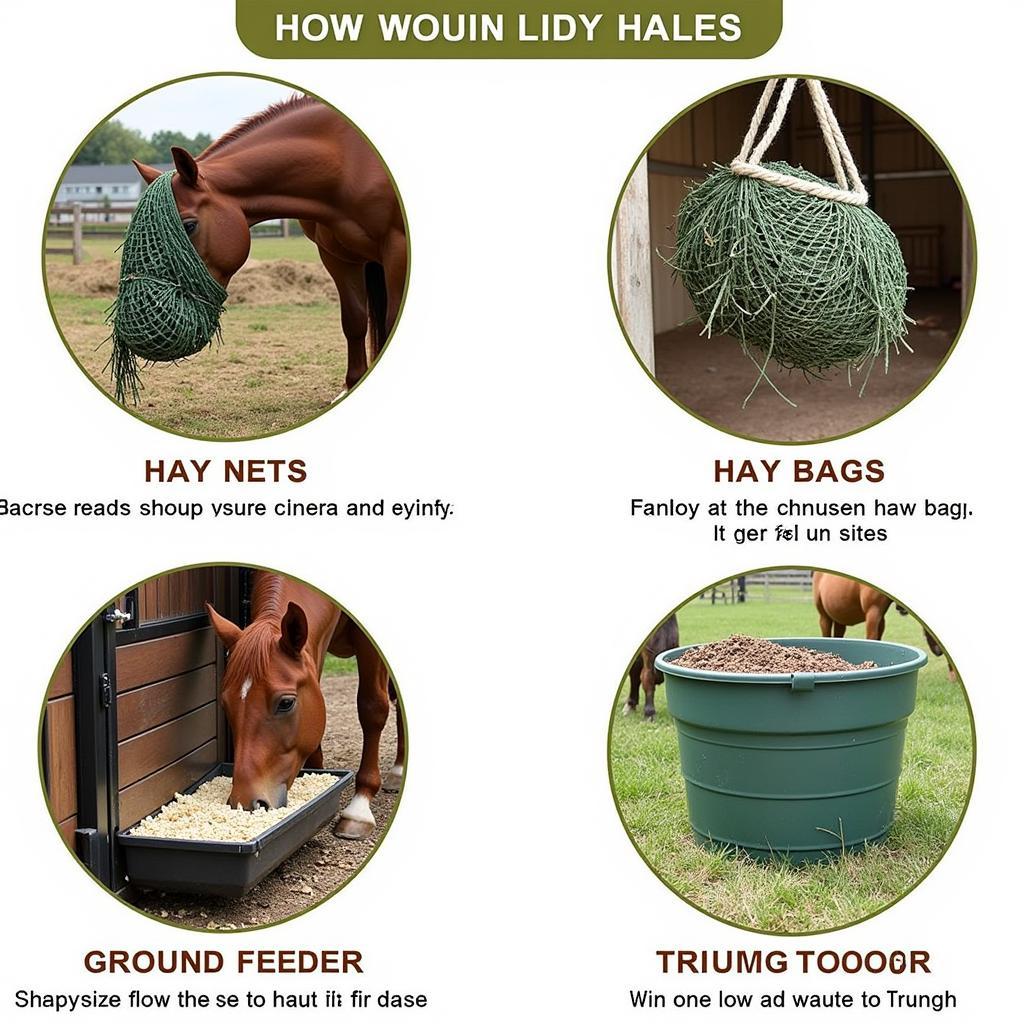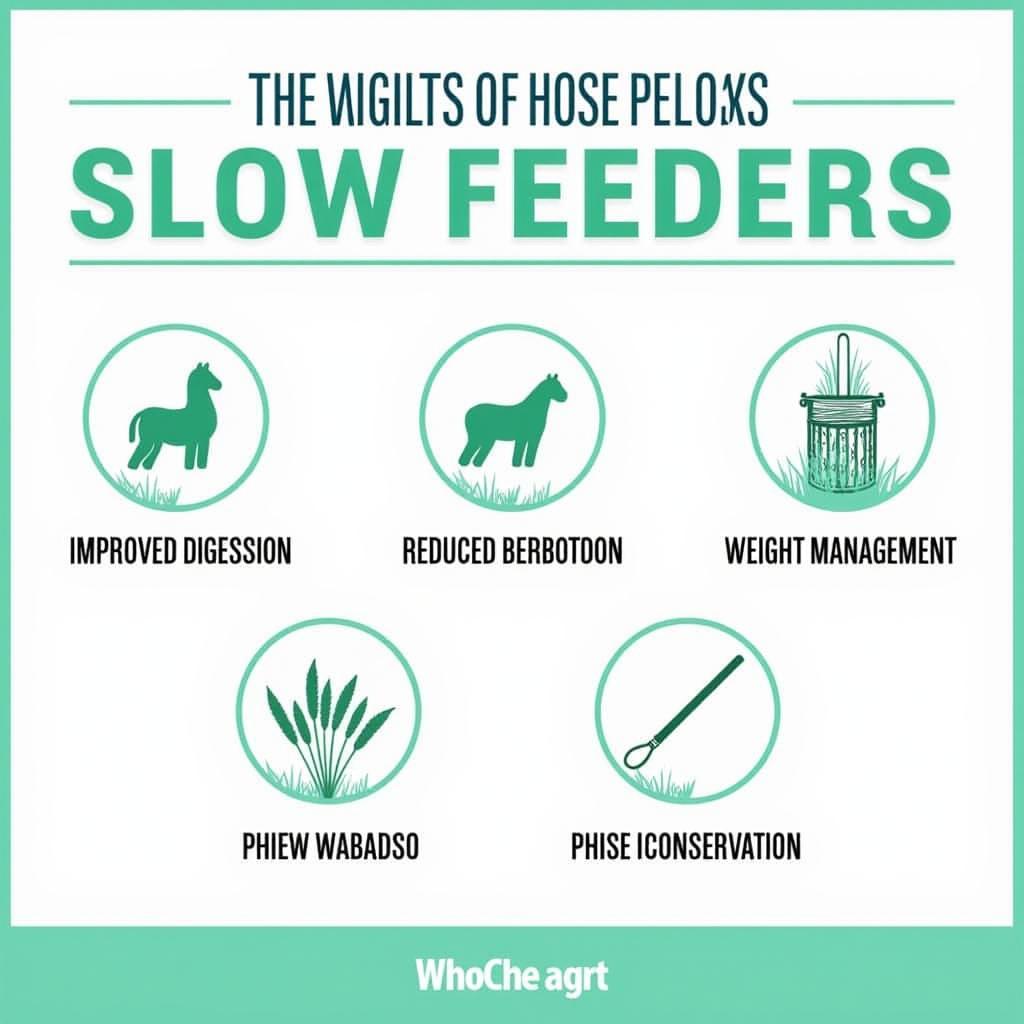Horse Slow Feeders are essential tools for managing your horse’s grazing habits and overall health. They mimic natural grazing patterns, promoting slower consumption of forage, which can prevent a range of digestive issues and improve your horse’s well-being. This comprehensive guide will delve into the benefits, types, and selection process for horse slow feeders, equipping you with the knowledge to make the best choice for your equine companion.
Why Use a Horse Slow Feeder?
Horses are designed to graze for extended periods, consuming small amounts of forage throughout the day. Modern stabling practices often disrupt this natural rhythm, leading to boredom, digestive upset, and even behavioral problems. A horse slow feeder effectively addresses these challenges by extending feeding times and reducing the rate of intake. This has numerous benefits, including:
- Improved Digestive Health: Slow feeders prevent horses from gorging, reducing the risk of colic and other digestive issues.
- Reduced Boredom and Stress: The act of foraging keeps horses occupied and mentally stimulated, minimizing boredom and associated stress behaviors like cribbing or weaving.
- Weight Management: By slowing down consumption, slow feeders can help prevent overeating and maintain a healthy weight, especially important for easy keepers.
- Hay Conservation: Slow feeders can minimize hay wastage caused by trampling and soiling, ultimately saving you money.
Check out our selection of horse slow feeders.
Types of Horse Slow Feeders
There’s a wide variety of horse slow feeders available, each designed with specific features and benefits. Choosing the right one depends on your horse’s individual needs, your management style, and your budget. Here are some common types:
- Hay Nets: These are a popular and affordable option, available in various sizes and mesh sizes. Smaller mesh sizes encourage slower eating.
- Hay Bags: Similar to hay nets, these are often designed for individual use and can be hung in stalls or trailers.
- Ground Feeders: These feeders sit directly on the ground and typically have a grid or other mechanism to slow down access to the hay.
- Trough Feeders with Slow Feed Inserts: These combine the convenience of a traditional trough with the benefits of a slow feed mechanism.
 Different Types of Horse Slow Feeders
Different Types of Horse Slow Feeders
Choosing the Right Slow Feeder for Your Horse
Selecting the right slow feeder involves considering several factors:
- Horse’s Size and Age: Smaller horses or ponies may require smaller feeders or nets with finer mesh. Older horses with dental issues may benefit from smaller mesh sizes or soaked hay in a slow feeder.
- Hay Type: The type of hay you feed can influence the appropriate mesh size. Fine-stemmed hay may require a smaller mesh than coarser hay.
- Management Style: If your horse lives in a stall, a hay bag or net might be suitable. For pasture use, a ground feeder is often preferable.
Our range of slow feeder for horse caters to various needs.
How to Introduce a Horse Slow Feeder
Introducing a slow feeder should be a gradual process to avoid frustration and ensure your horse adapts comfortably. Start by offering a small amount of hay in the slow feeder alongside their usual feeding method. Gradually increase the proportion of hay in the slow feeder while decreasing the amount offered in the traditional way. Observe your horse’s behavior and adjust the process as needed.
Maintaining Your Horse Slow Feeder
Regular cleaning and maintenance are crucial to ensure the longevity and hygiene of your slow feeder. Remove any uneaten hay regularly and clean the feeder with a mild detergent and water. Check for any signs of wear and tear and replace the feeder if necessary.
Slow Feeding and Horse Health: Expert Insights
Dr. Emily Carter, DVM, a renowned equine veterinarian, emphasizes the importance of slow feeding: “Slow feeders are invaluable for mimicking natural grazing patterns and supporting digestive health. They are a simple yet highly effective tool for preventing colic and promoting overall well-being.”
Browse our selection of horse hay slow feeder.
Conclusion
Horse slow feeders are a valuable investment in your horse’s health and well-being. They promote natural grazing behavior, improve digestion, reduce boredom, and can contribute to weight management. By carefully considering your horse’s individual needs and choosing the right slow feeder, you can significantly enhance their quality of life. Remember to introduce the slow feeder gradually and maintain it regularly for optimal results. Implementing a horse slow feeder is a simple yet powerful step toward ensuring your equine companion thrives.
FAQs
- How long does it take a horse to get used to a slow feeder? It typically takes a few days to a week.
- Can I use a slow feeder for all types of hay? Yes, but adjust the mesh size accordingly.
- Are slow feeders suitable for horses with dental problems? Yes, they can be beneficial, especially with soaked hay.
- How often should I clean my horse slow feeder? Regularly remove uneaten hay and clean it weekly.
- Can I use a slow feeder in the pasture? Yes, ground feeders are designed for pasture use.
- What are the signs of a horse not adapting to a slow feeder? Signs include frustration, pawing, and not eating.
- Where can I buy high-quality horse slow feeders? Justus Horses USA offers a great selection of slow feeders.
You can explore our range of slow feeder hay bags horses for more options.
 Benefits of Using Horse Slow Feeders
Benefits of Using Horse Slow Feeders
Other questions you might have: How to choose the right mesh size for a slow feeder? What are the different materials used for slow feeders? Can I make my own DIY slow feeder?
Explore other articles on our website: Horse Nutrition, Horse Health, Stable Management.
Need assistance? Contact us 24/7 at Phone: 0772127271, Email: [email protected] or visit our location at QGM2+WX2, Vị Trung, Vị Thuỷ, Hậu Giang, Việt Nam. Our dedicated customer support team is ready to help you. You can also check our collection of slow feeder for horses.